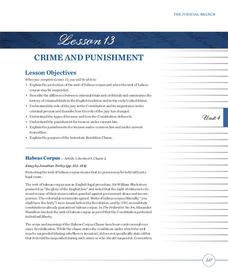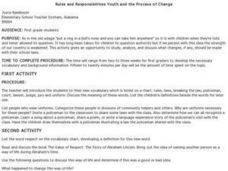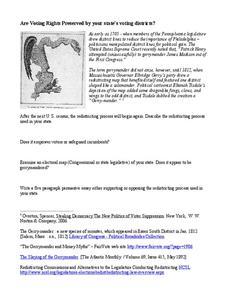Curated OER
More Basic Biotechnology Tools, Sorting & Copying DNA
You can use these slides to explain the many complicated steps of the Polymerase chain reaction. The diagnostic and forensic uses of gel electrophoresis are detailed. This PowerPoint could be used to communicate facts, and also to prompt...
Curated OER
The Leed's footballers' trial
Learners explore what happens when someone is tried for a crime. They expand their knowledge of the name "Criminal Justice System" and develop discussion skills. Students read the story Leeds footballer guilty of fighting in public. ...
Curated OER
You and the Judicial System
Students explore how the structure of the state and federal judicial systems affect them. They select an appropriate media and create a presentation on the structure of the judicial system, the criminal judicial system and a guide to the...
Curated OER
Tort Liability: Mock Trial
Students explore the trial process and the tort concept of host liability.
Curated OER
What Makes a Good Judge?
Learners define qualities that should be considered when selecting judge, evaluate costs and benefits of two methods of selecting and retaining judges, decide whether methods provide for judicial independence
and judicial accountability,...
Curated OER
Juvenile Justice - Consequences Of Offenses To Offenders, Victims, And Community
Students learn of the consequences of juvenile crime and how the state of Washington includes victims in the juvenile justice process.
Heritage Foundation
Crime and Punishment
You wouldn't give someone a 10-day timeout for eating a piece of candy. The US government, too, does not believe in unreasonable punishment. A variety of exercises exploring the clauses of the US Constitution prompts class members to...
Curated OER
Fingerprints
This activity provides an interesting way for learners to review vocabulary and practice comprehension skills. There is a six-paragraph passage about the process of fingerprinting and the role it takes on convicting criminals. Eleven...
Anti-Defamation League
Exploring Solutions to Address Radical Disparity Concerns
The deaths of Michael Brown, Eric Garner, and Tamir Rice, and the protests that followed the 2014 shootings, are the focus of a current-events activity that asks class members to brainstorm and research possible strategies to address the...
NYC Department of Records
Citizenship and Elections: The Importance of a Ballot
Approximately 58 prcent of those eligible voted in the 2016 US Presidential election. In an attempt to impress upon learners the importance of voting and voting rights, class members examine primary source documents related to the...
Utah State Courts
Judges in the Classroom
Class members explore the process of a disposition hearing for juveniles, particularly looking at how the judge decides what sentence the juvenile offender should receive. Task your pupils with evaluating different sample cases provided...
Curated OER
More Basic Biotechnology Tools
You can use these slides to explain the many complicated steps of the Polymerase Chain Reaction. The diagnostic and forensic uses of gel electrophoresis are detailed. This PowerPoint could be used to communicate facts, or to prompt...
Curated OER
Rules and Responsibilities Youth and the Process of Change
First graders learn vocabulary in regards to laws, courts, and policeman. They read and discuss the book, The Value of Respect: The Story of Abraham Lincoln. An attorney visits the classroom and discusses the roles of judges and juries.
Curated OER
Using Blood Tests to Identify Babies and Criminals
Young scholars solve a crime by matching a suspect's blood type to physical evidence collected at the crime scene. In this forensic science lesson plan, students identify the different blood types. They explain how blood tests work.
Judicial Learning Center
The Players in the Courtroom
Courtrooms are complicated. In addition to the many rules, there are a number of people whose jobs are not very clear to the casual courtroom observer. With the resource, individuals identify some of these roles and review more...
Curated OER
The Case of the Plugged Toilets:
Students identify the process for settling a criminal dispute (how are the facts of the case presented; how is the dispute resolved?, and
Curated OER
High Crimes and Misdemeanors
High schoolers gather information about the meaning and process of impeachment through reading and discussion. Next, students role play hypothetical cases.
Curated OER
And the Verdict Is...
Students identify the unique pattern DNA forms in each individual, and how that pattern can be used to identify criminals. They have the opportunity to simulate the process of matching DNA samples to those taken at a crime scene.
Curated OER
Did Jack break the law?:
Students identify the process for settling a legal dispute, identify key players in a legal dispute (who presents the facts; who makes the final decision) and determine what makes a decision fair.
Curated OER
That's MY Pencil: Simplified Mock Trial
Learners identify the process for settling a legal dispute, identify key players in a legal dispute (who presents the facts; who makes the final decision), and determine what makes a decision fair.
Curated OER
Police Use MySpace
Students interview law enforcement officials concerning their use of the Internet to catch criminals. They research how MySpace operates. They interview staff at MySpace and its uses. They write a news feature about a criminal case...
Curated OER
Supreme Court
Eleventh graders explore the redistricting process. In this American Government lesson, 11th graders examine the electoral map. Students write an essay posing an argument for the redistricting process.
Judicial Learning Center
Your 4th Amendment Rights
Americans love to learn about their rights, especially those that protect them from the government's power to invade their privacy. Young people are especially engaged by this topic. An informative lesson explores four Supreme Court...
Judicial Learning Center
Why Study Landmark Cases?
Why study landmark Supreme court cases? A helpful lesson offers a brief but valuable argument for the importance of these cases in the field of criminology. It introduces scholars to some key terms necessary for studying court cases and...























